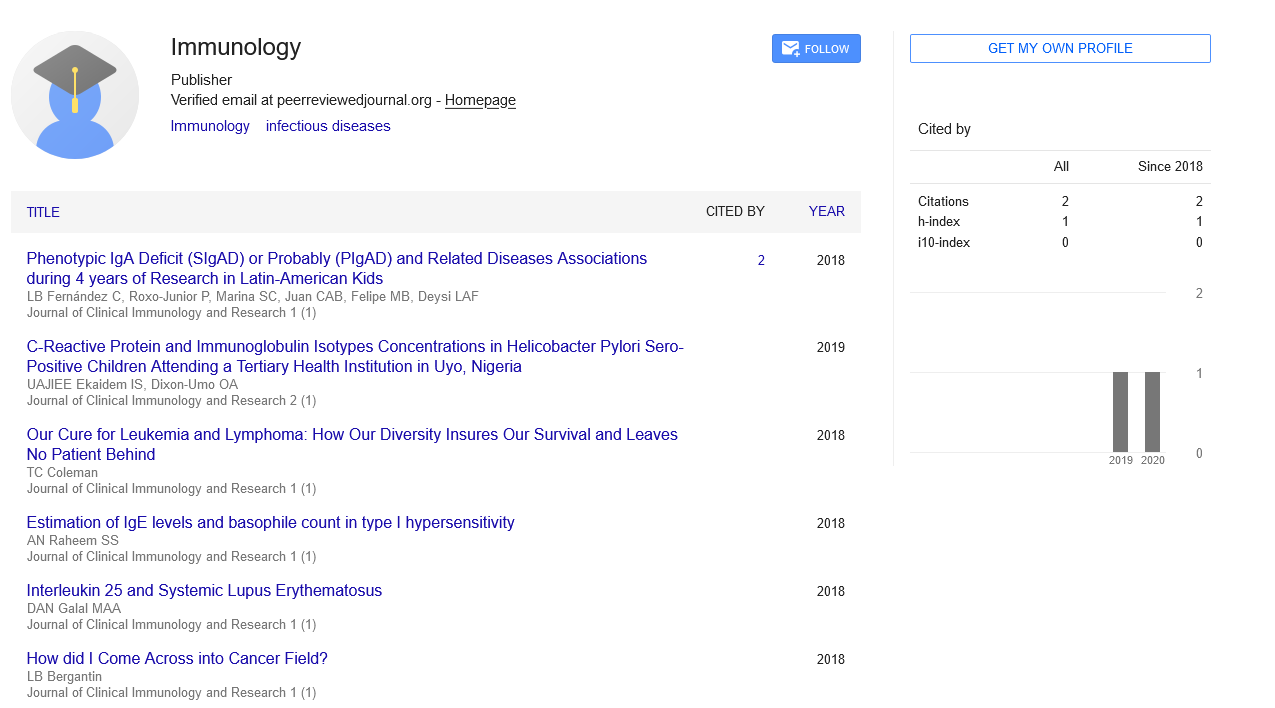Perspective, J Clin Immunol Res Vol: 6 Issue: 2
Immunostimulation: Boosting the Immune System Defenses
Garcia Olson*
1Department of Medicine, University of California, San Francisco, USA
*Corresponding Author: Garcia Olson,
Department of Medicine, University of
California, San Francisco, USA
E-mail: olsongracia@gmail.com
Received date: 15 May, 2023, Manuscript No. JCIR-23-104726;
Editor assigned date: 17 May, 2023, PreQC No JCIR-23-104726(PQ);
Reviewed date: 01 June, 2023, QC No JCIR-23-104726;
Revised date: 08 June, 2023, Manuscript No JCIR-23-104726 (R);
Published date: 16 June, 2023, DOI: 10.4172/JCIR.100082
Citation: Olson G (2023) Immunostimulation: Boosting the Immune System Defenses. J Clin Immunol Res 6:2.
Abstract
Description
The immune system is a remarkable defense mechanism that protects our bodies from harmful pathogens and foreign substances. However, there are times when the immune system needs a boost to enhance its ability to fight infections and diseases. This is where immunostimulation comes into play. Immunostimulation refers to the activation or enhancement of the immune response, aiming to strengthen the body's natural defenses.
Mechanisms of immunostimulation
Immunostimulation can be achieved through various mechanisms that activate or enhance different components of the immune system. One approach is the administration of immunostimulatory molecules, such as cytokines or toll-like receptor agonists, which trigger immune cell activation and cytokine production. Another strategy involves the use of vaccines, which contain antigens that stimulate the immune system to produce a specific response and generate long-term immunity.
Applications of immunostimulation
Immunostimulation has diverse applications in healthcare. It plays a major role in vaccination programs, where the goal is to induce a protective immune response against specific pathogens. Vaccines stimulate the immune system by introducing harmless antigens derived from the target pathogen, allowing the immune system to recognize and mount a defense against future infections.
Immunostimulation is also employed in the treatment of certain cancers, where immune checkpoint inhibitors or adoptive cell transfer techniques, such as CAR-T cell therapy, are used to enhance the body's immune response against tumor cells. Additionally, immunostimulation has shown potential in the management of chronic infections, such as hepatitis B or C, by boosting the immune system's ability to clear the virus.
Immunostimulation and autoimmune diseases
In autoimmune diseases, where the immune system mistakenly attacks the body's own cells and tissues, the goal of immunostimulation is more complex. The aim is to modulate the immune response and restore immune tolerance. Immunostimulatory molecules, such as immune modulators or biologics, can be used to regulate the immune system and dampen excessive inflammation. This approach aims to rebalance the immune response and reduce autoimmune activity.
Immunostimulation and aging
As we age, the immune system undergoes changes that can make individuals more susceptible to infections and diseases. Immunostimulation strategies can be used to boost the immune response in older adults. For example, vaccination programs targeting older populations aim to enhance the effectiveness of vaccines and provide better protection against infectious diseases.
Potential benefits and considerations
Immunostimulation holds the potential to enhance immune responses and improve overall health. By strengthening the immune system's ability to fight infections, immunostimulation can reduce the incidence and severity of diseases. It also offers opportunities for personalized medicine, as the immune response can vary among individuals.
However, careful consideration must be given to potential risks and side effects. Excessive immune activation can lead to unwanted inflammatory responses or autoimmune reactions. Balancing the desired immune response with potential adverse effects in the development and implementation of immunostimulation strategies.
Conclusion
Immunostimulation offers a promising avenue for boosting the immune system's defenses and improving health outcomes. From vaccines to immunomodulatory therapies, the ability to activate or enhance immune responses holds great potential in preventing and treating infections, managing autoimmune diseases, and combating certain cancers. Continued research and advancements in immunostimulation approaches will pave the way for more effective interventions and personalized strategies, benefiting individuals of all ages and promoting better overall immune health.
 Spanish
Spanish  Chinese
Chinese  Russian
Russian  German
German  French
French  Japanese
Japanese  Portuguese
Portuguese  Hindi
Hindi 